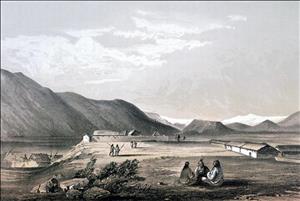On December 15, 1813, representatives of the North West Company of Montreal officially take possession of Fort Okanogan from the Pacific Fur Company of New York. Alexander Ross (1783-1856), a clerk employed by the Pacific Fur Company, transfers his allegiance to the North West Company and continues in charge of the post.
Fort Okanogan had been built in September 1811 by members of the Pacific Fur Company, who had journeyed from New York to found a commercial enterprise in the Northwest. With headquarters at Fort Astoria near the mouth of the Columbia, the Astorians had sent parties into the interior to compete with the North West Company, a Canadian fur trading firm based in Montreal. Fort Okanogan, at the mouth of the Okanogan River (in present-day Okanogan County), was in charge of Scottish clerk Alexander Ross, who reported collecting more than 1,500 beaver pelts in trade during his first winter in residence.
The outbreak of the War of 1812 between Great Britain and the United States in June 1812 had serious repercussions for the American posts on the Columbia. Short of supplies and fearing an attack from a British war ship, the resident partners of the Pacific Fur Company decided to sell their holdings to their Canadian rival, the North West Company. Representatives of both companies signed a sales agreement at Fort Astoria on October 16, 1813, and 12 days later Astorian partner Donald McKenzie (1783-1851) led a canoe party up the Columbia to the interior posts on the Okanogan and Spokane rivers "to see the property delivered over to the North West Company, agreeably to the late contract" (Ross, 253).
According to Alexander Ross, the clerk in charge at Fort Okanogan, Donald McKenzie and Nor'Wester John Stuart (1780-1847) arrived on December 15, 1813. During the next five days, they inventoried the goods and furs at Okanogan, thus officially completing the sale of what had been the first American post in present-day Washington.
During the process of closing the Pacific Fur Company accounts, John Stuart apparently offered Alexander Ross an opportunity to join the North West Company. Several other Astorians had made the decision "to step from one concern to the other, inasmuch as the newcomers were very anxious to secure the services of persons whose local experience might prove favorable in conducting the trade" (Ross, Fur Hunters, 9).
After considering the offer, Ross, who described his attitude toward his future as "bent on making a spoon or spoiling a horn," signed a contract for a term of seven years. He was assigned to continue his former job as the head of Fort Okanogan, which remained in North West Company hands until their merger with the Hudson's Bay Company in 1821 (Ross, Fur Hunters, 9).

